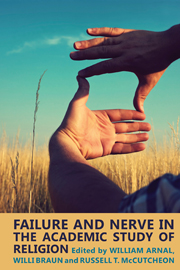Book contents
- Frontmatter
- Content
- Preface
- Acknowledgments
- Contributors
- Epigraph
- The Nerve of Donald Wiebe
- The Failure of Nerve in the Academic Study of Religion
- General Failures
- Catching Up with Marx: Truth, Myth, and the Niceties of “Belief”
- Fixed Geomorphologies and the Shifting Sands of Time
- A Critical History of Religion as a Psychological Phenomenon
- Everything Old Is New Again
- Revisiting the Confessional: Donald Wiebe's “Small ‘c’ Confessional,” Its Historical Entailments and Linguistic Entanglements
- Special Failures
- In Lieu of Conclusion
- Index of Authors
Revisiting the Confessional: Donald Wiebe's “Small ‘c’ Confessional,” Its Historical Entailments and Linguistic Entanglements
from General Failures
- Frontmatter
- Content
- Preface
- Acknowledgments
- Contributors
- Epigraph
- The Nerve of Donald Wiebe
- The Failure of Nerve in the Academic Study of Religion
- General Failures
- Catching Up with Marx: Truth, Myth, and the Niceties of “Belief”
- Fixed Geomorphologies and the Shifting Sands of Time
- A Critical History of Religion as a Psychological Phenomenon
- Everything Old Is New Again
- Revisiting the Confessional: Donald Wiebe's “Small ‘c’ Confessional,” Its Historical Entailments and Linguistic Entanglements
- Special Failures
- In Lieu of Conclusion
- Index of Authors
Summary
1.
Sometime in the late 1980s, the academy as a whole entered a phase of intense self-scrutiny, occasioned by a combination of factors ranging from the end of the Cold War, to a radical shift in the way universities around the world were funded, to the conditions of the American culture wars, to various theorists’ shrill insistence on something called “reflexivity.” Remarkably, Religious Studies was at that time already well poised to join the orgy of self-criticism. One of the texts that prepared us so well for the emergence of the dedicated sub-discipline of Religious Studies commonly called “method and theory” was Don Wiebe's “The Failure of Nerve in the Academic Study of Religion,” which appeared in 1984.
It was a full decade after the appearance of that article that I was appointed to my first full-time academic position in the Department and Centre for the Study of Religion at the University of Toronto. I had just completed a doctorate and a two-year postdoctoral fellowship in History (German Reformation), and was a neophyte in Religious Studies. So I read hundredsof articles and monographs in my first years as a bona fide “religionist.” None impressed me as deeply as Wiebe's article. To this day, among the carefully cultivated rows in the maturing forest of methodologically and theoretically “informed” studies of religion—poststructuralist, postmodernist, postcolonialist, etc.—Wiebe's article still towers above and stands apart, an ancient tree affording unique orientation for those lost in the woods.
- Type
- Chapter
- Information
- Failure and Nerve in the Academic Study of Religion , pp. 95 - 110Publisher: Acumen PublishingPrint publication year: 2012



